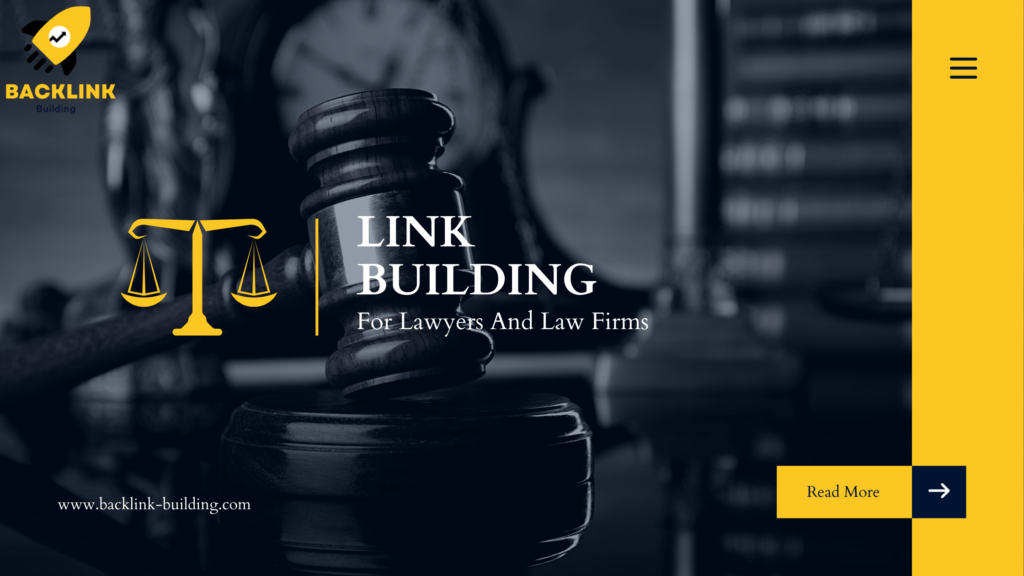
Law firms must use every possible strategy to enhance their online presence in the increasingly competitive digital marketing landscape. One of the most effective methods is link building.
This guide delves into the strategic implementation of link building for lawyers, highlighting its profound impact on enhancing a law firm’s SEO. By strategically acquiring high-quality backlinks, law firms can amplify their website’s traffic.
This increased visibility elevates their search engine rankings and augments their potential client base. Ultimately, adept link-building enables law firms to stand out in the crowded digital landscape, solidifying their online presence and fostering sustainable growth.
Understanding Link Building
Link building is a crucial aspect of search engine optimisation (SEO) that involves acquiring hyperlinks from other websites to your own. Hyperlinks, commonly known as links, guide users across the web from one page to another.
For search engines, these links serve as pathways to crawl and index content, enabling them to discover new pages and assess the relevance and authority of a webpage. Effective link building enhances a site’s visibility and influences its ranking in search engine results pages (SERPs).
It involves strategic outreach, content creation, and relationship building to earn quality backlinks from reputable sources. Link diversity and quality are critical factors, as they indicate to search engines the reliability and value of a website’s content.
A well-executed link-building strategy can significantly impact a site’s organic search performance and digital marketing efforts.
Why Link Building Matters
Link building matters significantly in the realm of search engine optimisation (SEO) for several reasons:
- Improved Search Engine Rankings: Search engines like Google use links as one of the main factors determining a website’s authority and relevance for particular search queries. Websites with high-quality backlinks rank higher in search engine results pages (SERPs).
- Increased Organic Traffic: Higher rankings mean more visibility in search results, which can lead to increased organic (non-paid) traffic to your website. This traffic is often more valuable as it consists of users actively searching for the products, services, or information you provide.
- Building Authority and Trust: Quality backlinks from reputable websites signal to search engines and users that your site is trustworthy and authoritative in its niche. This trust and authority can translate into more conversions and long-term customer loyalty.
- Referral Traffic: Backlinks from other websites improve your SEO and bring direct traffic. Users clicking on relevant links from other websites will likely be interested in what your site offers, potentially leading to new customers or followers.
- Brand Visibility and Awareness: Link building often involves outreach and collaboration with other websites, influencers, or bloggers in your industry. This collaboration can increase your brand’s visibility among new audiences who may not know your business.
- Long-Term Benefits: Unlike other SEO tactics that may fluctuate with algorithm changes, building a solid backlink profile can have long-term benefits for your website’s visibility and authority, as long as the links are from reputable and relevant sources.
- Competitive Advantage: In competitive industries, effective link-building can be a crucial factor that sets your website apart. It can help you outrank competitors in search results and establish your brand as a leader in your field.
Link Building Strategies For Lawyers
Lawyers and law firms can benefit from several effective link building strategies, especially when targeting niche areas such as link building for law firms. These methods focus on creating high-quality, relevant, and engaging content that naturally attracts backlinks from other websites.
By producing informative articles, case studies, or legal guides that address common legal issues or offer insightful commentary, law firms can enhance their online presence and credibility within the legal community.
1. Content Creation And Promotion

Content is the cornerstone of effective link building, especially in specialised fields like link building for lawyers. Producing valuable, informative, and shareable content tailored to legal topics increases the likelihood of other websites linking to your pages. Here are some content strategies to consider:
Blog Posts And Articles
Regularly publishing blog posts and articles on your law firm’s website, especially on topics like “link building for lawyers,” can attract valuable backlinks. For instance, an article titled “Common Mistakes in Personal Injury Claims” can draw links from websites focused on legal advice or personal injury issues.
This strategic approach enhances your website’s authority and improves its visibility in search engine results, making it easier for potential clients to find you online.
Such content positions your firm as an expert in the field, building trust and credibility with your audience and search engines. Consistent, high-quality content drives traffic and encourages other reputable sites to link to yours, further boosting your site’s performance.
It can lead to higher search rankings and more client inquiries, creating a virtuous growth cycle for your practice.
Case Studies
Case studies are pivotal tools in showcasing legal expertise and success, crucial for lawyers engaging in link-building strategies. They offer detailed insights and real-world examples, demonstrating competence in handling specific legal issues.
These case studies highlight achievements and provide valuable content for other websites to reference and link to. By doing so, they effectively enhance online visibility and credibility within the legal profession.
Each case study is a testament to the lawyer’s capabilities, illustrating their ability to navigate complex legal landscapes and achieve favourable client outcomes. They are powerful marketing assets that bolster reputation and attract potential clients seeking proven expertise and reliable legal representation.
Infographics
Infographics are potent assets for lawyers aiming to elevate their digital footprint and draw increased website traffic. Crafting engaging infographics on legal subjects, such as effective link building strategies tailored for lawyers, holds substantial potential to amplify the visibility of your online platform.
These visually captivating graphics simplify intricate legal concepts, facilitating more transparent comprehension for potential clients and prompting other websites to cite and link back to your content if deemed valuable.
This dual benefit enhances accessibility to legal information and bolsters your site’s authority in the digital sphere, fostering greater trust and recognition among clients and peers alike.
Guides And E-books
Guides and e-books are indispensable tools in legal resources, offering comprehensive insights that cater to potential clients and websites alike. An example includes crafting an e-book, “Understanding Divorce Laws in [Your State],” a highly link-worthy asset.
Such resources educate and establish credibility, positioning law firms as authoritative sources. They provide detailed explanations and interpretations of intricate legal topics, ensuring clarity for readers navigating complex legal landscapes.
These guides can enhance SEO efforts through strategic keyword integration and backlink opportunities, driving traffic and engagement. Legal guides and e-books empower individuals to make informed decisions by proactively addressing common queries and concerns, fostering trust and establishing long-term relationships with clients and partners.
2. Guest Blogging

Guest blogging is a highly effective strategy for lawyers aiming to bolster their online presence through link building, especially in competitive niches like link building for lawyers.
By contributing articles to other websites or blogs within the legal industry, attorneys can cultivate valuable backlinks while establishing themselves as authoritative figures. Targeting blogs or websites with robust domain authority that align with your practice areas is crucial.
This strategic outreach enhances visibility and strengthens credibility among peers and potential clients. Through guest blogging, lawyers can showcase their expertise, share insights, and engage with a broader audience, fostering meaningful connections within the legal community.
This proactive approach boosts SEO efforts and reinforces professional reputation and trustworthiness, which are essential for sustained success in today’s competitive legal landscape.
3. Local Citations And Directories
Local citations and directories enhance your law firm’s online visibility. You can gain valuable backlinks that improve your website’s authority by listing your firm in reputable local business directories and legal directories such as Avvo, FindLaw, and the American Bar Association’s directory.
These directories are known for their high quality and credibility in the legal community, making them effective platforms to showcase your firm’s expertise and services. Consistency is vital when listing your law firm’s information across these directories, as it reinforces your firm’s credibility and trustworthiness to potential clients and search engines.
This consistency boosts your local SEO efforts and ensures potential clients can easily find accurate information about your firm online. Therefore, optimising your presence on these directories can significantly contribute to your law firm’s online marketing strategy and overall visibility in your local market.
4. Partnerships And Sponsorships

Forming strategic partnerships and engaging in sponsorships are potent strategies to enhance your law firm’s SEO impact, particularly in highly competitive sectors such as link building for legal services.
By sponsoring local events or forging alliances with complementary businesses, you can leverage their networks and audiences to amplify your online presence.
For instance, sponsoring a charity event or legal seminar can lead to your law firm being prominently featured and linked on event websites and promotional materials. This increases your visibility within the legal community and strengthens your authority online.
These partnerships broaden your reach and establish valuable backlinks crucial for improving your search engine rankings. In competitive fields like law, where trust and reputation are paramount, such collaborations can also enhance your firm’s credibility and trustworthiness among potential clients.
By actively participating in community events and supporting local initiatives, you contribute to the community and boost your firm’s SEO strategy through meaningful engagements and valuable connections.
5. Press Releases

Issuing press releases can significantly enhance your visibility and credibility in the legal field. Whether announcing a landmark case victory or the expansion of your practice, these announcements are powerful tools to attract media coverage and secure valuable backlinks from news websites.
Ensure your press releases are newsworthy and meticulously crafted to maximise their impact. Choose reputable distribution channels to reach your target audience effectively.
By strategically leveraging press releases, you can bolster your firm’s reputation and establish authority within the legal community. Emphasise key achievements and unique selling points to captivate journalists and potential clients, fostering greater awareness and trust in your expertise.
6. Social Media Engagement

Social media engagement is crucial in digital visibility and content dissemination, especially in niche markets like link building for lawyers. Although social media links don’t directly influence SEO rankings, they significantly enhance content visibility.
You can broaden your audience’s reach by sharing blog posts, infographics, and other content on LinkedIn, Twitter, and Facebook. Increased visibility on these platforms creates more opportunities for others to discover and link to your content organically, which is essential for effective link building for lawyers.
This can boost your content’s authority and relevance, benefiting your SEO efforts. Therefore, active social media engagement expands your content’s reach and amplifies its potential impact across the digital landscape.
7. Legal Forums And Q&A Sites

Legal forums and Q&A sites such as Avvo, Quora, and Reddit offer valuable opportunities for professionals to showcase their expertise and build credibility. Lawyers can provide detailed and insightful answers to legal inquiries by actively engaging in these platforms, enhancing their online presence and authority.
They incorporate links to their websites when relevant, directing traffic and generating backlinks, improving search engine visibility.
This proactive approach educates the public and fosters trust and recognition within the legal community, ultimately contributing to a robust online reputation.
8. Broken Link Building

Broken link building is a strategic SEO tactic in which you identify broken links on other websites in your niche using tools like Ahrefs or Check My Links. Once identified, you notify the site’s web admins of the broken links.
By suggesting your relevant content, such as insightful guides on link building for lawyers, as a replacement, you help them maintain a healthier site and create an opportunity for gaining backlinks.
This method leverages existing link opportunities and demonstrates your expertise by providing valuable content solutions. It’s a proactive approach that enhances your site’s visibility and credibility within your industry, benefiting both parties.
Best Practices For Link Building

Here are some best practices:
1. Focus On Quality Over Quantity
Not all backlinks are created equal. A few high-quality backlinks from authoritative websites are far more valuable than numerous low-quality links. Prioritise acquiring links from reputable sites with high domain authority.
2. Diversify Your Backlinks
To create a natural and diverse backlink profile, aim to get backlinks from various sources. This includes industry blogs, news sites, local directories, and more. A diverse backlink profile appears more organic to search engines.
3. Avoid Black Hat Techniques
Engaging in black hat SEO methods like purchasing links or joining link farms may lead to harsh penalties from search engines. Instead, prioritise ethical, white-hat strategies that enhance your website’s long-term value.
4. Monitor Your Backlinks
Regularly monitor your backlink profile to ensure the links you acquire are beneficial. Tools like Google Search Console, Ahrefs, and Moz can help you track your backlinks and identify any harmful links that need to be disputed.
5. Build Relationships
Networking and building relationships with other professionals in your industry can lead to more link building opportunities. Engage with influencers, bloggers, and other legal professionals to foster relationships, resulting in natural backlinks.
6. Keep Up with SEO Trends
SEO is constantly evolving, and staying updated on the latest trends and algorithm changes is essential. Follow reputable SEO blogs and attend industry conferences to keep your knowledge current.
Measuring The Success Of Your Link Building Efforts
It’s crucial to measure and analyse its outcomes. Here are several essential metrics to monitor:
1. Domain Authority (DA)
Domain Authority, developed by Moz, is a metric that predicts how well a website will rank on search engine result pages (SERPs). An increase in your law firm’s DA indicates that your link building efforts are improving your website’s overall authority.
2. Organic Traffic
Monitor your website’s organic traffic using tools like Google Analytics. Increasing organic traffic can strongly indicate that your link-building efforts are paying off.
3. Referral Traffic
Referral traffic comes from users clicking on your backlinks. Analysing referral traffic can help you understand which links drive the most visitors to your site.
4. Keyword Rankings
Track the rankings of your target keywords to see if they improve over time. Higher keyword rankings, mainly through effective link building for lawyers, can increase visibility and traffic.
5. Number and Quality of Backlinks
Use SEO tools to track the number and quality of backlinks you acquire. Focus on building a healthy mix of high-quality backlinks from diverse sources.
Final Thoughts
Now that you know more about link building and how it can benefit your law firm, it’s time to implement some of these strategies. If you need help figuring out where to start, link building for lawyers, such as through guest blogging, is a great option.
By guest blogging on other websites, you can showcase your expertise, build relationships with other professionals in your industry, and drive traffic back to your site.
So what are you waiting for? Start implementing these law firm link building strategies today! Still, have questions about link building for lawyers or in general?
Leave a comment below, and we’ll be happy to answer them! This is the end of the blog post. Thank you for reading! We hope you found this information helpful.
Thanks again, and good luck with your link-building efforts! 🙂


